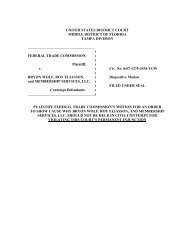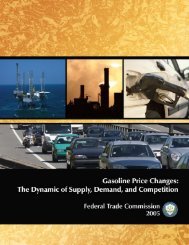Complaint Counsel's Post Trial Brief - Federal Trade Commission
Complaint Counsel's Post Trial Brief - Federal Trade Commission
Complaint Counsel's Post Trial Brief - Federal Trade Commission
You also want an ePaper? Increase the reach of your titles
YUMPU automatically turns print PDFs into web optimized ePapers that Google loves.
472. LaMont does not know whether BioMixx is effective in the prevention, treatment, or cure<br />
of cancer. (LaMont, Tr. 580-81).<br />
II. COMPLAINT COUNSEL'S PROPOSED CONCLUSIONS OF LAW<br />
1. The acts and practices charged in the <strong>Complaint</strong> in this matter took place in or affecting<br />
commerce within the meanng of<br />
the <strong>Federal</strong> <strong>Trade</strong> Commssion Act, as amended.<br />
Nationwide adverising, marketing, or sales activity ofthe sort that Respondents engaged<br />
in constitutes "commerce" under the FTC Act. See, e.g., P.F. Coller & Son Corp. v.<br />
FTC, 427 F.2d 261, 272 (6th Cir. 1970); see, e.g., Ford Motor Co. v. FTC, 120 F.2d 175,<br />
183 (6th Cir. 1941) (noting that commerce also includes the actions, communcations,<br />
and other acts or practices that are incident to those activities).<br />
2. The Complait charges Respondents with violating Sections 5 and 12 of the FTC Act.<br />
The Commssion has jursdiction over the subject matter of this proceeding pursuant to<br />
those sections ofthe FTC Act. Section 5(a) provides that ''ufai or deceptive acts or<br />
practices in or affecting commerce are hereby declared unawfuL." 15 U.S.C. § 45(a)(1).<br />
The FTC is "empowered and directed" to prevent unfai or deceptive practices in<br />
commerce by "persons, parnerships, or corporations." 15 U.S.C. § 45(a)(2).<br />
3. The Commssion has jursdiction over persons, parerships, and corporations. 15 U .S.C.<br />
§ 45(a)(2). "Corporations" are defied in Section 4 of the FTC Act as "any company. .<br />
.which is organzed to car on business for its own profit or that of<br />
its members." 15<br />
U.S.C. § 44. Therefore, the <strong>Commission</strong> has jursdiction over Respondent DCO and<br />
Respondent James Feijo.<br />
4. Section 12 prohibits the dissemation of "any false adversement" in order to induce the<br />
purchase of "food, drgs, devices, or cosmetics." 15 U.S.C. § 52(a)(2). For the puroses<br />
of Section 12, the DCO Products are "food" or "drgs." 15 U.S.C. § 55(a), (b), (c)<br />
(defig "food" as, among other thngs, "aricles used for food or drink for man," and<br />
defig "drug" as, among other thgs, "aricles intended for use in the diagnosis, cure,<br />
mitigation, treatment, or prevention of disease in man"). Section 12 defines "false<br />
adverisement" as "an adverisement, other than labeling, which is misleading in a<br />
materal respect." 15 U.S.C. § 55.<br />
5. Respondents' speech is not protected by the First Amendment because it is deceptive<br />
commercial speech. The U.S. Supreme Cour has held that when the content of<br />
commercial speech is false or misleading, it can be suppressed. "There can be no<br />
constitutional objection to the suppression of commercial messages that do not accurately<br />
inform the public about lawful activity. The goverent may ban forms of.<br />
communcation more likely to deceive the public than to inform it." Central Hudson Gas<br />
& Elec. Corp. v. Public Service <strong>Commission</strong> of New York, 447 U.S. 557, 563, 100 S.Ct.<br />
2343,2350 (1980) (citing Friedman v. Rogers, 440 U.S. 1,99 S.Ct. 887 (1979)).<br />
Accordingly, "(t)he more limited protection accorded commercial speech perits the<br />
FTC to act when necessar to challenge false or deceptive advertising." In re Reynolds,<br />
40

















